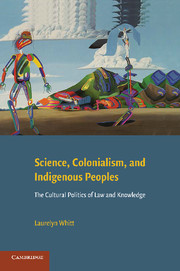Description
Science, Colonialism, and Indigenous Peoples
The Cultural Politics of Law and Knowledge
Author: Whitt Laurelyn
Examines how contemporary relations between indigenous and Western nations are shaped by the dynamics of power, the politics of property, and the apologetics of law.
Language: English
Subject for Science, Colonialism, and Indigenous Peoples:
Approximative price 36.76 €
In Print (Delivery period: 14 days).
Add to cart
Science, Colonialism, and Indigenous Peoples
Publication date: 05-2014
Support: Print on demand
Publication date: 05-2014
Support: Print on demand
Approximative price 101.81 €
Subject to availability at the publisher.
Add to cart
Science, colonialism, and indigenous peoples: the cultural politics of law and knowledge
Publication date: 08-2009
284 p. · 15.2x22.9 cm · Hardback
Publication date: 08-2009
284 p. · 15.2x22.9 cm · Hardback
Description
/li>Contents
/li>Biography
/li>
At the intersection of indigenous studies, science studies, and legal studies lies a tense web of political issues of vital concern for the survival of indigenous nations. Numerous historians of science have documented the vital role of late-eighteenth- and nineteenth-century science as a part of statecraft, a means of extending empire. This book follows imperialism into the present, demonstrating how pursuit of knowledge of the natural world impacts, and is impacted by, indigenous peoples rather than nation-states. In extractive biocolonialism, the valued genetic resources, and associated agricultural and medicinal knowledge, of indigenous peoples are sought, legally converted into private intellectual property, transformed into commodities, and then placed for sale in genetic marketplaces. Science, Colonialism, and Indigenous Peoples critically examines these developments, demonstrating how contemporary relations between indigenous and Western knowledge systems continue to be shaped by the dynamics of power, the politics of property, and the apologetics of law.
Part I. Biocolonialism as Imperial Science: 1. Imperialism then and now; 2. Indigenous knowledge, power and responsibilities; 3. Value-neutrality and value-bifurcation: the cultural politics of science; Part II. The Human Genome Diversity Project: A Case Study: 4. The rhetoric of research justification; 5. Indigenist critiques of biocolonialism; Part III. Legitimation: The Rule and Role of Law: 6. The commodification of knowledge; 7. Intellectual property rights as means and mechanism of imperialism; 8. Transforming sovereignties; Conclusions: the politics of knowledge: resistance and recovery.
Laurelyn Whitt is a Professor of Philosophy and Professor of Integrated Studies at Utah Valley University. She has also held visiting appointments at the Department of Maori Studies, University of Auckland; the Department of Science and Technology Studies, Cornell University; the University of Notre Dame Law School; and Osgoode Hall Law School. Professor Whitt is the co-author of The Bitter Fruit of American Justice (along with Alan W. Clarke) and the author of Interstices, a collection of poetry that won the 2005 Holland Poetry Prize.
© 2024 LAVOISIER S.A.S.




